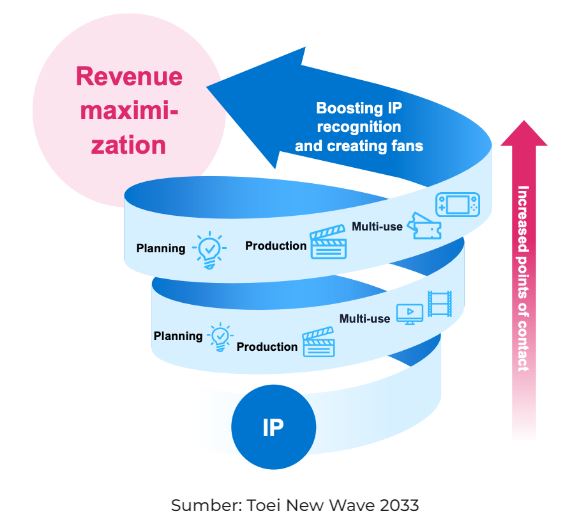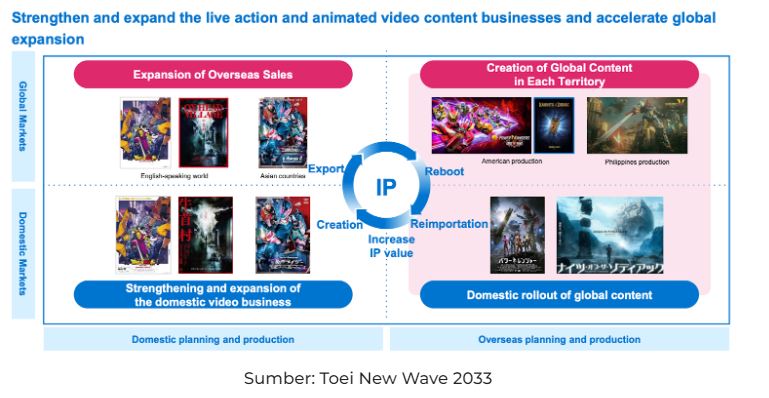The IP (Intellectual Property) business in the entertainment industry is up-and-coming. We can see how the Walt Disney Company became a giant by producing its own animated series and feature films and continuing to buy well-known IPs such as Marvel Heroes, Star Wars, and many more. The valuation of the company founded by Walter Elias Disney 100 years ago has reached USD 171.49 billion and is ranked 63rd company with the largest market capitalization in the world.
Meanwhile, from Japan, Toei Company, Co. Ltd., or simply Toei, is known as a producer of popular films and animations such as Dragon Ball, Saint Seiya, One Piece, Digimon, Sailor Moon, Super Sentai, and Kamen Rider. Classic series such as Gaban (Uchu Keiji Gavan), Voltus (Chodenji Machine Voltes V), and Goggle Five, which were popular in the 80s, were also produced by Toei.
However, unlike Disney, like most other Japanese companies, especially in the entertainment industry, they prioritize the local market and only make the global market a secondary target. According to Nora Mediana, Managing Director of Moxienotion, who has several times been entrusted with distributing Japanese-produced films to Indonesia, this policy applies the principle of embracing enthusiasts and succeeding in the local market before advancing in the global market.
“You have to speak to your local audience, and be relevant to them first before reaching out to a wider audience,” she explained.
This strategy of strengthening IP foundations in the country has to deal with a population growth crisis that is difficult to overcome. The continued reduction in the number of children and adolescents, the main target of this IP business, has reduced the income in the local market.
Even though Toei has produced more than 4,400 feature films and 38,000 TV series, income from licenses for using trademarks and copyrights of their works will decrease unless they make the global market their primary target.
Efforts to get out of this crisis were marked by the launch of a long-term vision called “Toei New Wave 2033”, which targets to increase global sales by 170%, or from the composition of the local to the global market, which was 70:30 to 50:50 in 2033.

So what strategy is done by Toei? The first, as has been and is commonly done by IP practitioners in the entertainment industry, is to extend the life of the IP itself, namely by recycling an IP so that it can continue to be known and loved from generation to generation.
One of the IPs that Toei relies on to carry out this mission is Kamen Rider, known in Indonesia as Ksatria Baja Hitam. In Japan, Kamen Rider, which first aired in 1971, has become a popular series that continues to be updated yearly. There are always new Kamen Riders with new transformation tools (called Henshin Belt), new bikes, new enemies, and other new uniqueness that are sold. Not only in the form of a TV series that airs in many countries but also in the form of a wide-screen film adaptation, besides the various toys and merchandise that fans are always hunting for.
The growing development of digital platforms also opens vast opportunities for this series to have more touch points to a broader market. If previously it was only available on TV screens, now it can be watched on cross-country streaming channels. Whether it was published via Toei’s official YouTube channel or the license was taken by a paid streaming platform that can be accessed worldwide. Of course, guarding the legality of granting cross-country licenses is a challenge. Because the protection of Intellectual Property is territorial, a limited license agreement must be paid close attention to so that it does not leak or fall into the hands of pirates.
Two Kamen Rider movies have screening dates in Indonesian cinemas in the last two months. The first is “Kamen Rider Geats × Revice: Movie Battle Royale”, screened on 31 May 2023, then “Shin Kamen Rider”, which will be screened in the last week of June 2023. These two films have regional licenses held by Neofilms Southeast Asia, and Moxienotion, aka PT Mitra Media Layar Lebar, hold the right in Indonesia.
IP Kamen Rider fans also enthusiastically welcomed the screening of these two films, especially since the screening of Shin Kamen Rider in Indonesia will be one of the earlier than neighboring countries. Shin Kamen Rider itself is a 121-minute remake of the first Kamen Rider series (1971) and was directed by Hideaki Anno, the director, and animator who gave birth to the IP Neon Genesis Evangelion, which became a phenomenon in the mid-90s.
Hopefully, this fan support will be converted into satisfactory ticket sales so that a mutually beneficial relationship between producers, distributors and fans can be maintained for other films in the future. Distributors are happy, fans are satisfied, and producers can meet their global sales targets.

In addition to intensifying the sale of its works globally, Toei is also opening itself up to foreign production houses to adapt its IP to suit the tastes of its audience. The latest project currently airing is “Voltes V: Legacy”, an entirely CGI robot series produced by GMA Entertainment for audiences in the Philippines. Voltes V was originally a robot animation series produced by Toei in 1977-1978, which was very popular in the Philippines because the story inspired the people to overthrow the Marcos regime in 1986. Because the popularity of this series is still immense, the fans who used to be children are now established, and current skills are also trying to bring back the Voltes robot with more sophisticated visual technology.
Toei’s support for the production house from the Philippines is a strategy to increase the value of IP through a cycle: “Creation – Export – Reboot – Reimportation.” From the same IP, the value can continue to grow because the license is purchased by outsiders, becoming new works that can be resold to the Japanese market and worldwide. It has been proven that Voltes V: Legacy, which is still airing on the GMA TV network, has been targeted by foreign TV stations, including Indonesia.
With Toei’s increasingly aggressive targeting and opening up to the global market, it is not impossible that the target of increasing revenue of 40 billion Yen from IP can be realised in 2033.
Because the IP business is up-and-coming, there is nothing wrong with creative people from Indonesia starting to focus on developing their IP and starting from being successful and creating in Indonesia to being able to go global, which ultimately brought in huge royalty income.
If you need further information regarding license agreements and copyright recordation in Indonesia and abroad, please get in touch with us via [email protected].
Source(s):








1 Comment